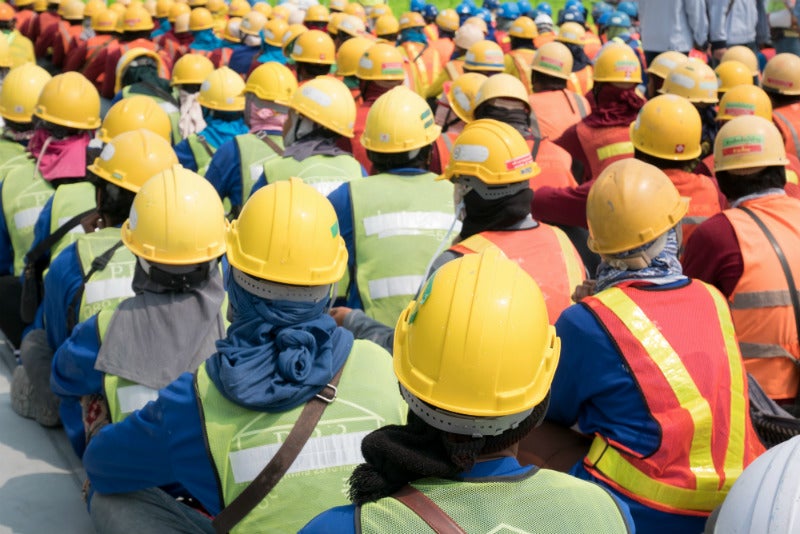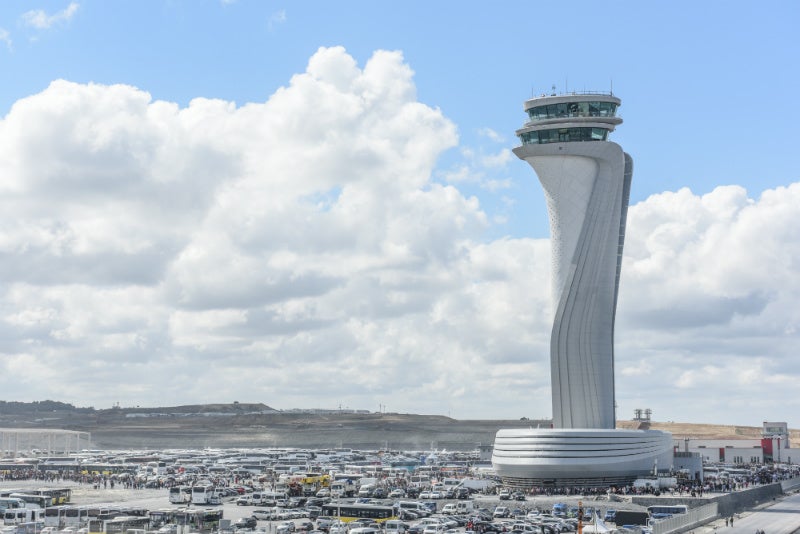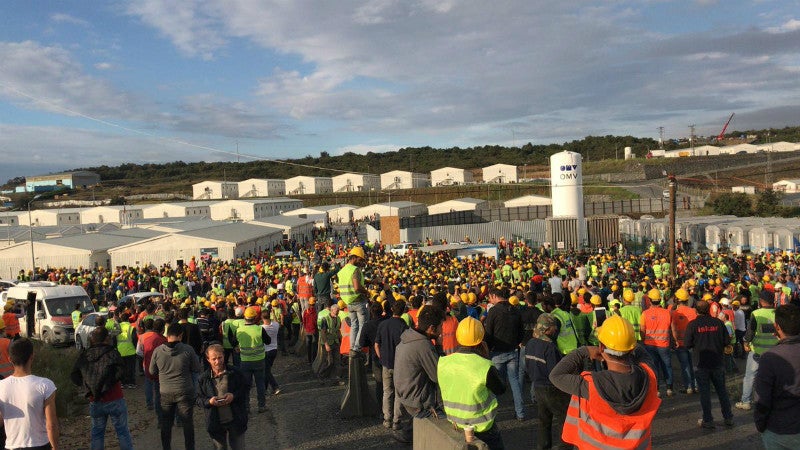
On 29 October 2018, President Recep Tayyip Erdogan flung open the doors of Istanbul Airport, shot-putting Turkish aviation into the world’s consciousness. The new hub is currently capable of accommodating up to 90 million passengers a year, and airport operator IGA expects this to rise to 200 million when the final construction phase is completed in 2025.
However, behind Istanbul Airport’s award-winning design elements and grand open interiors lurks a much darker reality; since its inception, the project has been marred by reports of unsanitary and unsafe conditions inflicted across segments of its 36,000-strong workforce.
Grievances reached a head in September last year, when more than 400 people were detained after a major protest in Istanbul, where Turkish police reportedly used tear gas to disperse crowds. The Confederation of Progressive Trade Unions of Turkey (DİSK) claimed that hundreds of employees were dismissed in the wake of the event, while 61 workers are currently still on trial for a number of crimes, ranging from property damage to ‘disrupting freedom to work’.
One of several prestige projects for Turkey’s Justice and Development party (AKP), Istanbul Airport has been designed to compete with airports in the Middle East to become the next major Eurasian transit hub. However, for trade unions and human rights organisations, the airport has become a symbol of the poor treatment of workers not just at the airport, but across Turkey.
“Prison-like” conditions

The September protests were triggered when workers were forced to wait in the pouring rain for heavily delayed transit buses travelling between their accommodation and the construction site. However, this isn’t the first time that workers have spoken up about conditions at the airport.
Özgür Karabulut is a construction worker and president of DİSK and Dev Yapı-İş (the Progressive Union of Construction Workers). He was imprisoned for two and a half months after meeting with IGA to convey workers’ demands following the protest.
He says that demonstrations to protest poor working conditions have in fact been going on for the last four years, but that efforts had been ignored by IGA senior management until last September.
“I met with workers after my release,” says Karabulut. “Dozens of them were in prison like me, hundreds were dismissed.”
Emma Sinclair-Webb, senior Turkey researcher with the Europe and Central Asia division of Human Rights Watch (HRW), said grievances ranged from substandard accommodation to wages being docked arbitrarily or left unpaid for months by subcontracting firms.
Workers reported bed-bug infestations and inedible food, with some posting pictures of cracked ceilings in their dormitories on social media. Anonymous reports from the media immediately following the September protest spoke of two-storey bunk beds being squeezed into tiny rooms at the workers’ barracks.
Lack of onsite safety monitoring
Sinclair-Webb says that in Turkey it is common practice that workers’ social security contributions get paid to them as though they were on minimum wage, even if they were being paid above this amount. Employers are also known to give workers extra cash in hand and not pay any contributions on top of this at all.
“This violates the law, means the worker cannot benefit from social security (e.g. pensions) to the extent they are paid, and it is also bad for Turkey’s social security system,” she says.
The project was also dogged by allegations about dangerous conditions. Last year, unions reported to Human Rights Watch that at least 38 workers had died in work-related accidents, before the Presidency admitted in December that it believed there had been around 52 deaths onsite.
In a response to a parliamentary question submitted by the Republican People’s Party (CHP) this January, Turkish Transport and Infrastructure Minister Mehmet Cahit Turhan stated that the number of workplace deaths was actually 55. He stressed 25 of these had been due to natural causes and gave a range of causes for the remaining 30 accidental deaths, such as workers not reattaching protecting measures after removing them, moving too close to a pond on the construction site, and ‘carelessness’.
“How can the number [of workplace deaths] vary? Because there is no proper reporting and investigation process,” says Sinclair-Webb. “And we really don’t know how many foreign workers may have died at the site. There seems to have been no effective investigation of work site deaths. The unions told us that the deaths are mainly as a result of falls from a great height because there is still a lot of usage of ladders rather than scaffolding and workers are not always provided with safety belts.”
Karabulut said occupational accidents continued to occur after the September demonstrations, in addition to further protests on “detained wages and conditions like food or shuttles”.
The aftermath

Following the protests, the majority of detained workers were released, but the number dismissed from their jobs by airport operator IGA remains unknown. Some 31 were held in pre-detention before being released after a hearing held on 6 December.
A total of 61 remain on trial on a number of charges, including disrupting freedom to work, violating the law on demonstrations and public assemblies, damaging public property, resisting police and possessing weapons.
In response to a request for comment, IGA provided a statement saying the project was carried out in accordance with the Constitution of the Republic of Turkey, health and safety regulations and International Labour Organisation contracts enforced in Turkey.
The company also said that after meeting with employees, IGA took steps such as providing shelters for the shuttle waiting zones, increasing the number of shuttle vehicles, procuring an additional mess tent to prevent queues in cafeterias, changing beds and boosting disinfection measures.
It says that allegations made are “unfounded and unacceptable”, and that persons with no connection to IGA and its subcontractors had trespassed on the airport project site and caused damage to cameras and dormitories.
Karabulut ripostes that even after his eventual release from prison, workers said that there had been no progress on working conditions, that repression from police forces on site had grown, and that working hours had been bumped up.
“It was gendarmerie who damaged dormitories; there are several photos and video footage proving that,” says Ozgur.
IGA also said that around 200,000 people worked on the project and that “923,000 people-based Occupational Health and Safety trainings were provided to employees”. But Karabulut says the difference between the figures only serves to demonstrate high turnover at the site.
“Hundreds of thousands worked on the project for short periods,” he says. “Many workers quit because of the working conditions. And they never received their wages or compensations.”
Amnesty International’s Turkey strategy and research manager Andrew Gardner says that while it was alleged that the detained individuals were at the scene, there was no individualised evidence of criminal acts committed by the workers.
“Based on our reading of the documents and following the events on the ground, these union leaders and construction workers being prosecuted are being pursued,” he says. “It’s a form of judicial harassment against them.”
A nationwide problem
It is far from the first time that Turkey has received bad press on labour conditions. Sinclair-Webb gives a chilling example in the western Turkish town of Soma, where 301 people died in a preventable mining accident as a result of heavy pressure to increase output without effective safety monitoring.
“There is certainly poor treatment of workers throughout the construction sector in Turkey and there is actually not enough reporting and monitoring of this area by human rights groups,” she says.
In July 2018, the Turkish Government ended a nationwide state of emergency that was imposed two years after a failed coup attempt. Thousands lost jobs as a result of this measure, but even after being lifted, the right to protest is severely restricted.
“It’s clear that on an issue as sensitive as this prestige project the authorities wouldn’t tolerate any dissent on this issue,” says Gardner. “The fact that the union haven’t tried to take to the street after that initial protest in September is just indicative of the level of the climate of fear in Turkey and how difficult it is to engage in peaceful protest.”
For the state of things to change, Gardner and Sinclair-Webb say the Turkish Government must respect rights to protest under its own laws and the European Convention on Human Rights. But when Turkey’s judicial system has seen more than 4,000 judges and prosecutors dismissed as a result of the coup, it’s uncertain whether those who protest for improved working conditions will receive a fair trial.
“There is extreme political pressure and interference with the judicial system in Turkey,” says Gardner. “Until there is an independent and impartial judiciary then you are likely to see politically motivated, trumped-up cases like this.”
In December, Turkish newspaper Milliyet reported that Istanbul Airport will only become fully operational in March. Its opening was more ‘symbolic’, with a smattering of airlines transferred from the overburdened Istanbul Atatürk Airport, but the new aviation hub will eventually accommodate aircraft flying to more than 350 destinations.
In the meantime, for the workers under investigation, trade unions and human rights organisations working to defend the Turkish right to protest, major challenges lie ahead.


